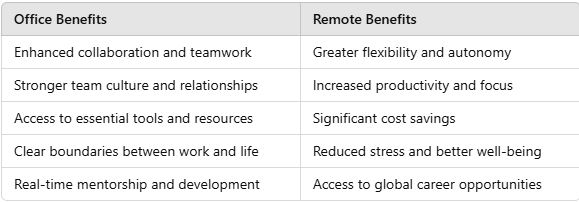Over the last few years, many people have been asking a big question: Is it better to work from the office or from home? Both choices have good points, and now, more companies are trying a mix of both; this is called the hybrid work model.
Working from the office can help with teamwork, quick meetings, and staying connected with others. On the other hand, working from home gives people more flexibility, saves travel time, and can help with focus.
As work continues to change, it’s important to know the benefits of both options. This helps companies make smart rules for their teams. It also helps workers choose what kind of space helps them do their best work and feel good.
In this post, we’ll look at what’s great about working in the office and what’s great about working at home. This way, you can think about what works best for you and your goals. Finding the right balance can lead to better work, less stress, and more success.
The Benefits of Working from the Office
1. Enhanced Collaboration and Communication
One big benefit of working in an office is better teamwork and easier communication. When you are in the same place as your team, it’s simple to talk, share ideas, and solve problems quickly.
Being together helps people come up with ideas on the spot. You can ask questions, get answers right away, and build on each other’s thoughts. This kind of teamwork can be hard to do over video calls.
Have you ever had a great idea while chatting at the coffee machine? Or found a fast solution during a group meeting? These small moments in the office often lead to big ideas.
Face-to-face time helps build trust and keeps everyone connected. It also makes it easier to stay on the same page. Working in the office can boost creativity and teamwork in ways that feel natural and exciting.
2. Stronger Team Culture and Relationships
Working in an office helps people feel more connected. Being in the same place with your team builds trust, friendship, and a sense of belonging. Simple things like team lunches, quick chats, and solving problems together make the work environment feel warm and welcoming.
For new employees, the office is a great place to learn how the company works, meet coworkers, and feel like part of the group. It’s easier to understand the company’s values and goals when you see them in action.
When people work side by side, they often build strong personal connections. These relationships help teams work better together and support each other during tough times.
A friendly office atmosphere also helps everyone feel happier and more motivated. This makes it easier to do great work and enjoy the job. Being together makes teams stronger.
3. Access to Resources and Tools
Not everyone has the right tools at home to do their job well. That’s where the office can really help. Offices are set up with everything you need to work better and faster.
In the office, you’ll find things like high-speed internet, printers, comfy chairs, and quiet rooms for meetings. These tools make it easier to focus and get things done without delays or stress. For some jobs, special equipment or extra security is needed. Working in the office makes it simple to use these tools safely.
Having the right space and tools can make a big difference in how well and how quickly you work. At home, distractions or poor setups can slow you down. But in the office, everything is built to support your success. That’s why offices are great for staying productive and focused.
4. Clear Work-Life Boundaries
Going to the office helps you clearly separate work time from personal time. When you leave home and go to work, your brain switches into “work mode.” And when you leave the office at the end of the day, it’s easier to stop thinking about work and enjoy your free time.
This clear boundary helps you focus better during work hours and relax more after work. It also lowers the chance of feeling tired or burnt out from working all the time. At home, it’s easy to get distracted by kids, pets, or chores. These things can make it hard to concentrate. In the office, you have a quiet space just for work, without personal interruptions.
Having a set place and time for work helps you stay more balanced and feel less stressed. It’s good for both your job and your well-being.
5. Professional Development Opportunities
Working in the office gives you great chances to learn and grow. When you are around your team and leaders, you can ask questions, get feedback, and learn new skills right away.
Being in the same space as experienced coworkers helps you see how they work and solve problems. You can learn just by watching or talking with them. The office also gives you the chance to join workshops, team meetings, and small training sessions. These help you grow faster in your job and build your confidence.
You may also get to shadow a manager or take part in special projects. These experiences can help you understand more about your role and plan for your future. In short, the office is a great place to grow your career. It’s full of learning opportunities that are easier to find in person than online.
The Benefits of Working from Home
1. Greater Flexibility and Work-Life Balance
Working from home gives people more freedom with their time. You can plan your day to fit both work and personal needs. For example, you might go to your child’s school event, take a break for a walk, or enjoy lunch with family.
This kind of flexibility helps you feel less stressed and more balanced. When you have control over your schedule, it’s easier to finish work on time and take care of yourself, too. You can make space for hobbies, rest, or exercise, whatever helps you feel good. When people feel better, they often work better too.
Remote work allows you to focus on what matters most, both at home and at work. It helps you give your best without feeling overwhelmed. In the end, having a flexible routine can lead to a healthier and happier life, while still getting the job done.
2. Increased Productivity
Working from home can help many people get more done. Without traffic, office noise, or sudden meetings, it’s easier to focus on your tasks. You can set up your workspace just the way you like it, quiet, with music, or with comfy seating.
At home, you can take breaks when needed without feeling judged. This helps you stay fresh and ready to work. Studies have shown that many people working from home finish more work than those in the office, especially when the job needs deep thinking and focus.
Fewer distractions mean more time to get important things done. You don’t waste energy on commuting or handling office interruptions. A calm, personal space can help you feel more comfortable and stay on track. This leads to better results and less stress.
When your environment works for you, your productivity can really grow.
3. Cost Savings
Working from home can save money for both employees and companies. Employees don’t have to spend on gas, train tickets, or daily lunches. There’s also no need to buy special clothes for work. These small savings can add up quickly.
At the same time, companies can save money too. They don’t need to pay as much for office space, electricity, cleaning, or supplies. Some businesses even switch to smaller offices or shared spaces. This helps both sides workers keep more of their paycheck, and companies spend less to run the business.
With these savings, people can enjoy a better life. They might use the extra money for family, health, or hobbies. Companies can also use the saved money for team growth or better tools. Remote work isn’t just about comfort; it’s also smart for the budget. Everyone wins.
4. Reduced Stress and Improved Wellbeing
Commuting every day can be tiring and stressful. Sitting in traffic or rushing for a train takes up time and energy. Working from home removes this stress completely.
With no travel, people have more time to relax, eat breakfast, or enjoy time with family. This helps them feel calm and ready for the day. At home, you can also set up your workspace just the way you like. You can wear comfy clothes, light a candle, or take a short break in your garden. These small things make a big difference.
A peaceful work environment can help you feel better, both in your mind and your body. You can work without pressure and take better care of yourself. Remote work supports a healthier, happier way of working. Less stress means more focus, more smiles, and better results.
5. Access to a Wider Talent Pool
Remote work helps companies hire people from anywhere, not just from nearby cities. This means they can find the best person for the job, no matter where they live. It also helps workers apply for jobs without needing to move to a new place.
For people living in small towns or places with fewer job options, this is a big change. Now, they can work for top companies, earn better pay, and grow their careers, all from home. Companies also benefit. They get access to talented people from different places and backgrounds. This brings fresh ideas and skills to the team.
Remote work has opened new doors for both employers and employees. It helps connect great jobs with great people, no matter the distance. This is good for everyone and leads to more equal job chances for all.
Comparing the Two Approaches
Both working from the office and working from home offer significant benefits; it all comes down to what individuals and organizations value most. Here’s a quick comparison to highlight the key differences:

Hybrid Work Model: The Best of Both Worlds
The hybrid work model gives people the best of both worlds. It mixes time at the office with time working from home. This balance helps both employees and companies do better.
At the office, people enjoy teamwork, quick chats, and sharing ideas in person. These moments help build strong relationships, solve problems faster, and make work more fun and creative.
At home, people can work in peace and plan their day in a way that fits their life. No long commute means more time for family, hobbies, or rest. This leads to less stress and more happiness.
The hybrid work model helps people feel trusted and respected. They get their work done while also caring for their well-being. Companies see better results, happier teams, and less turnover. It also lets businesses hire talent from anywhere, which brings in new ideas and skills.
The best part? Hybrid work is flexible. Offices can become spaces for teamwork and creativity, while tools help people work well from anywhere. The future of work is not one-size-fits-all. It’s about creating a workplace where everyone feels good, works well, and grows together.
Finding the Right Balance
The future of work isn’t just about where we work; it’s about how we work. Both office and remote work have their own special benefits. When used together, they can help people work better and feel better too.
For employers, the hybrid work model means they get the best of both. Offices become places where teams connect, share ideas, and solve problems quickly. At the same time, remote work gives employees the freedom to focus, reduce stress, and work in a way that suits them best.
When both styles are blended well, companies see more success. Teams are happier, more creative, and more likely to stay long-term.
For employees, it’s important to ask: What kind of space helps me do my best work? Some people love the energy of the office. Others prefer the quiet of home. And many enjoy a mix meetings with coworkers when needed, but also having quiet time to focus.
The real goal is to build a work life that feels good and works well. Flexibility isn’t just a nice bonus, it helps everyone do better. So, what about you? Do you like working in the office, from home, or both? Share your thoughts below, I’d love to know what works for you!

